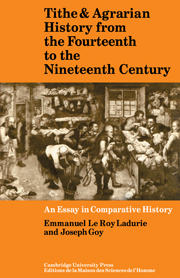 Tithe and Agrarian History from the Fourteenth to the Nineteenth Century
Tithe and Agrarian History from the Fourteenth to the Nineteenth Century Book contents
- Frontmatter
- Contents
- List of figures
- Preface
- Part I Methodology
- 1 The tithe: an old source for new research
- 2 The tithe in France and elsewhere
- 3 Methodology
- 4 Towards another kind of history of the tithe, production and productivity
- Part II Comparative study of trends
- Notes
- References
- Title in the series
- Industrialization before Industrialization Rural Industry in the Genesis of Capitalism
3 - Methodology
Published online by Cambridge University Press: 05 November 2011
- Frontmatter
- Contents
- List of figures
- Preface
- Part I Methodology
- 1 The tithe: an old source for new research
- 2 The tithe in France and elsewhere
- 3 Methodology
- 4 Towards another kind of history of the tithe, production and productivity
- Part II Comparative study of trends
- Notes
- References
- Title in the series
- Industrialization before Industrialization Rural Industry in the Genesis of Capitalism
Summary
The tithe as a source
In France, the tithe has traditionally been studied by canon lawyers or historians of institutions, first with the purpose of justifying the tithe or improving the methods of collection (till 1789), and later to estimate the importance of the tithe relative to other dues the peasants of the ancien régime were obliged to pay to the State, the Church and the seigneurs. For the last twenty years the tithe has been looked at from a radically different angle, and, in the course of the two great national and international surveys and other studies mentioned in the previous chapter, it has become the focus of a new type of research. This is because of the nature of the tithe, because it is possible to constitute long series, sometimes spanning several centuries, and because it enables us to make comparative studies of a very large number of European or non-European countries in the preindustrial period. It is the ambiguous nature of the tithe which makes it so interesting to the historian: it was an integral part of the dues extracted by the ruling class from the gross agricultural product, but it belongs essentially to Quesnay's second category, that of the net product.
If every tithe represents a movement of the net product between those liable to pay and those entitled to receive it, it also represents a proportion (varying locally) of the gross product – in other words of the harvests.
- Type
- Chapter
- Information
- Tithe and Agrarian History from the Fourteenth to the Nineteenth CenturyAn Essay in Comparative History, pp. 24 - 60Publisher: Cambridge University PressPrint publication year: 1982


